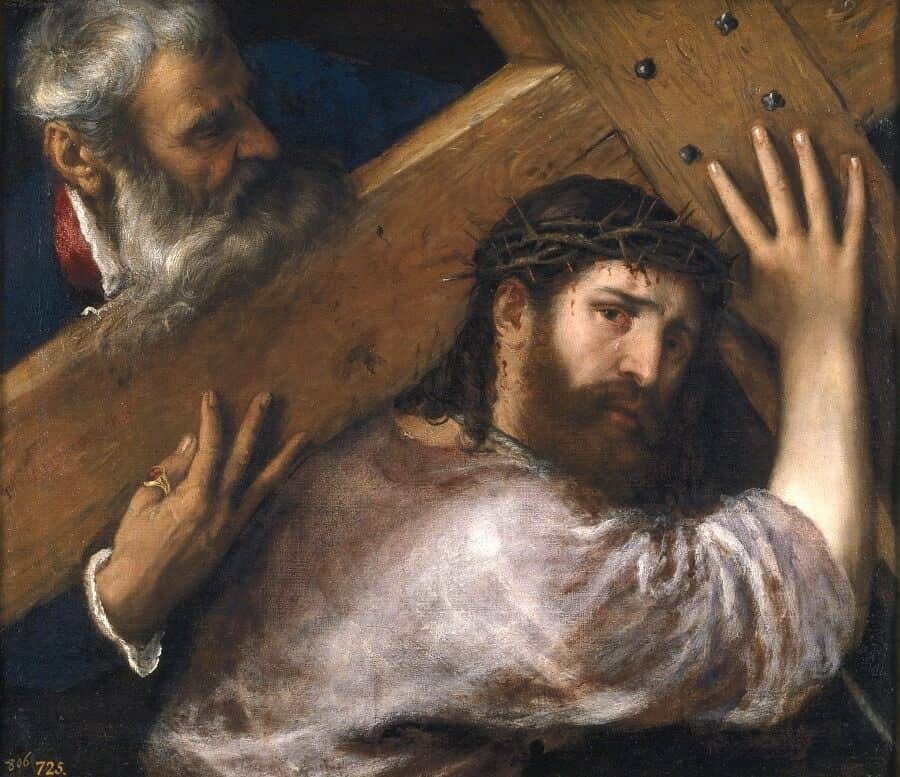Love’s Labor’s Lost , the first comedy published in Shakespeare’s lifetime, comes out clearly against the political machine. Shakespeare cements his place in print as the rebel writer preaching Catholic truths to a regime attempting to root out all traces of the old faith and true religion. As always with Shakespeare, the set up scene sets the stage for the story, and functions as a commentary for his Catholic audience.
In the set-up scene, two key items describe life in England for Catholics.
The first, the King and his close friends take a vow to forsake love and devote themselves to study. Let’s quickly unpack the allegorical meaning. The vow is a stand-in for the Oath of Supremacy, required by all who take public office, or as hinted in the play, also required by all who study in an English university. When modern critics are astounded and confounded that there is no record that so great a mind like Shakespeare’s went to university, it’s easy for Catholics to understand why. Catholics were barred by the government from attending English universities. To take the Oath of Supremacy is to forsake Christ and his bride.
Yes, once the Crown created a State church, they made it illegal for Catholics to hold public office or attend university in order to force obedience to the regime’s new religion, the church for Anglicans. For Catholics, the only universities available were on the continent. So, of course, there’s no record of Shakespeare attending the university, it would have meant apostasy to our Savior and the Church he loved.
Or, as Berowne in the play notes, the other option is “necessity will make us all forsworn.”
The second key theme to our set up scene, there is a proclamation that it is “a year’s imprisonment to be taken with a wench.” Costard tells the King he heard the proclamation, but not its observance. “I do confess much of the hearing it, but little of the marking of it.”
In allegorical terms, Shakespeare is alluding to Queen Elizabeth’s Thirty Nine Articles of Religion, finalized in 1571, which describe the beliefs of the State church. In the play, the clown confesses that many people heard these proclamations, but few are observing them, insinuating that England remains firmly Catholic. Once again, Berowne foretells, “I’ll lay my head to any good man’s hat, these oaths and laws will prove an idle scorn.”
Shakespeare’s comedies are filled with gravities, and this is a comedy with much hilarity in the form of political satire. Very soon after taking their vows to study and forsake love, a Princess from France shows up with her attending ladies. Immediately, the King and his Lords find themselves foresworn of their oaths to study and avoid love. The Princess tells the King, “‘Tis deadly sin to keep that oath, my lord.”
Since this is a comedy, all the lords find love with the ladies and the hilarity ensues in how they try to justify the foolishness of their earlier vows as they profess their divine love to the ladies.
My vow was earthly, thou a heavenly love;
Thy grace, being gained, cures all disgrace in me.
Vows are but breath, and breath a vapor is:
Then thou, fair sun, which on my earth dost shine,
Exhal’st this vapor vow; in thee it is.
If broken then, it is no fault of mine;
If by me broke, what fool is not so wise
To lose an oath to win a paradise?
A little later, Berowne once again tells the fellows,
Let us once lose our oaths to find ourselves,
Or else we lose ourselves to keep our oaths.
It is religion to be thus forsworn,
For charity itself fulfills the law
And who can sever love from charity?
The message to this short play is clear, lose our Oath of Supremacy to find ourselves devoted to Christ and in communion with his holy Church. When one reads the Oath for itself, you realize that it is not simply Catholics that can’t take the Oath of Supremacy, but any Christian. The diabolic logic of Oath of Supremacy is it not only denies the Catholic church, but also Christ, our King.
Oath of Supremacy: "I, A.B., do utterly testify and declare in my conscience that the queen's highness is the only supreme governor of this realm and of all other her highness's dominions and countries, as well in all spiritual or ecclesiastical things or causes as temporal, and that no foreign prince, person, prelate, state, or potentate hath or ought to have any jurisdiction, power, superiority, pre-eminence, or authority, ecclesiastical or spiritual, within this realm; and therefore I do utterly renounce and forsake all foreign jurisdictions, powers, superiorities, and authorities, and do promise that from henceforth I shall bear faith and true allegiance to the queen's highness, her heirs, and lawful successors, and to my power shall assist and defend all jurisdictions, pre-eminences, privileges, and authorities granted or belonging to the queen's highness, her heirs, and successors, or united or annexed to the imperial crown of this realm: so help me God and by the contents of this Book."
Or, as better said by Shakespeare, “what fool is not so wise to lose an oath to win a paradise?”
If any man would come after me, let him deny himself and take up his cross and follow me. For whoever would save his life will lose it, and whoever loses his life for my sake will find it. For what will it profit a man, if he gains the whole world and forfeits his life? Or what shall a man give in return for his life?
Jesus of Nazareth, King of Kings
Christ Carrying the Cross, by Titian (1508)




